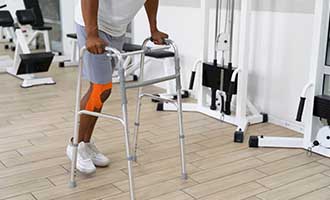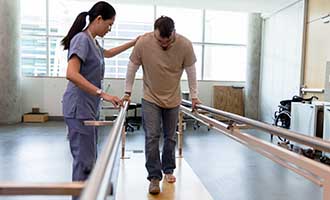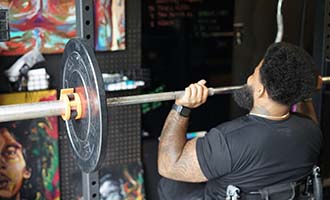Why Routine Health Check-Ups Matter for Wheelchair Users
Ensuring Long-Term Well-Being and Independence Through Preventive Health Monitoring

Maintaining good health is essential for everyone, but it holds particular significance for wheelchair users. Regular health check-ups and preventive care play a crucial role in managing and monitoring overall well-being, allowing wheelchair users to lead healthier and more fulfilling lives. Here's why routine health check-ups are vital for wheelchair users and how they contribute to long-term health.
1. Early Detection of Potential Health Issues
Routine check-ups enable healthcare professionals to detect potential health issues early, allowing for timely intervention. For wheelchair users, who may be at risk for specific conditions such as pressure sores, urinary tract infections, or respiratory issues, early detection is key to preventing complications. By catching these problems early, they can be treated more effectively, reducing the risk of more severe health problems down the line.
2. Personalized Health Management
Every individual's health needs are unique, and this is especially true for wheelchair users. Regular check-ups provide an opportunity for healthcare providers to tailor health management plans to the specific needs of the individual. This personalized approach ensures that all aspects of health, including mobility, nutrition, and mental well-being, are addressed comprehensively.
3. Monitoring and Managing Chronic Conditions
Many wheelchair users live with chronic conditions, such as spinal cord injuries, muscular dystrophy, or multiple sclerosis. Routine health check-ups are essential for monitoring these conditions, ensuring that they are managed effectively. Regular visits to healthcare professionals allow for adjustments in treatment plans, medication, and lifestyle recommendations, helping to maintain a better quality of life.
4. Preventive Care and Health Education
Preventive care is an integral part of regular health check-ups. During these visits, healthcare providers can offer valuable advice on lifestyle changes, such as diet, exercise, and hygiene practices, that can prevent common health issues. For example, they might recommend specific exercises to improve circulation or tips on skin care to prevent pressure sores. Health education empowers wheelchair users to take control of their health and make informed decisions about their well-being.
5. Mental Health and Emotional Well-being
Health check-ups are not just about physical health; they also provide an opportunity to address mental and emotional well-being. Wheelchair users may face unique psychological challenges, including feelings of isolation or depression. Regular check-ups allow healthcare providers to screen for mental health issues and provide support or referrals to counseling services. Ensuring mental well-being is just as important as physical health in maintaining a high quality of life.
6. Building a Strong Healthcare Relationship
Consistent check-ups help in building a strong and trusting relationship with healthcare providers. This relationship is crucial for effective health management, as it fosters open communication and collaboration. A strong healthcare partnership ensures that wheelchair users receive the best possible care tailored to their needs, promoting better health outcomes.
7. Enhancing Independence and Quality of Life
Ultimately, regular health check-ups contribute to maintaining and enhancing independence for wheelchair users. By staying on top of health issues, preventing complications, and managing chronic conditions effectively, wheelchair users can enjoy a better quality of life. Routine health monitoring ensures that they remain active and engaged in their daily activities, allowing them to live life to the fullest.
Conclusion
Routine health check-ups are a vital aspect of health monitoring for wheelchair users. They offer numerous benefits, from early detection of potential health issues to personalized health management and preventive care. By prioritizing regular check-ups, wheelchair users can take proactive steps towards maintaining their health, enhancing their independence, and enjoying a higher quality of life. Whether it's physical, mental, or emotional well-being, regular health monitoring is the key to living a healthier, happier life in a wheelchair.
Related
-

The Importance of Wheelchair Assistance for the Elderly
-

How to Help People with Disabilities: A Guide to Inclusive Practices
-

The Ultimate Guide to Choose the Right Walking Devices for Adults
-

Fashion Forward: Style Tips for People with Limited Mobility
-

The power of Pilates
-

Adaptive Fitness: Exercise Tips for Individuals with Limited Mobility
-

Rollin' in the Greens.
-

Understanding the Benefits of In-Home Elder Care for Loved Ones
-

Top Benefits of Visiting a Physical Therapy Clinic
-

Beginners, chair cardio is the way to go!
-

How to Choose Reliable Mobility Services at Home in Mumbai
-

The Role of Hydration in Health and Wellness
-

Focus your mind to stay healthy
-

Breathing right can change your life
-

Dating with a Disability: Navigating Love, Relationships, and Mobility Challenges
-

Top Qualities to Look for in Elderly Carers in Mumbai
-

Tips to Choose the Right Physical Therapist for Your Needs
-

Get in the game
-

Wheels of Support
-

Physiotherapy tips for home
-

Rolling Towards Peace
-

Benefits of Hiring a Companion for Elderly Care in Mumbai
-

Stay in shape with Yoga
-

Enhancing Sleep Quality for Wheelchair Users
-

Understanding Spina Bifida: Symptoms, Types, and Early Detection
-

Finding the Perfect Health Service Provider: Tips for Elderly Care









